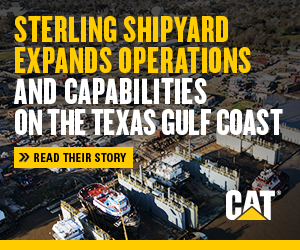Van Raalte Moderates Adaptive Management Webinar
Gerard van Raalte led a webinar on adaptive management (AM) in dredging projects on January 19 sponsored by the Central Dredging Association’s (CEDA) Environmental Commission. Speaking to a worldwide audience Van Raalte explained that AM is a framework that allows flexible decision-making in the course of a project.
Projects are often permitted with conditions and thresholds based on the best understanding of conditions he said but uncertainties still exist concerning the effects and responses by nature. In this case there is a need for a less rigid management structure which can be provided by AM to specify objectives and give suggestions and recommendations on how to apply the adaptive processes.
Van Raalte who recently retired from Boskalis’s in-house engineering group Hydronamic is chairman of CEDA’s working group on Adaptive Management.
AM is a relatively formal process working toward high efficiency while aiming for a good ecological state he said. There are five steps in the revolving AM process any one of which can be adapted during the course of the project. They are plan design implement monitor and evaluate. In van Raalte’s exhibit he illustrates a need to adapt during the evaluation stage followed by moving back into implementation after the situation is taken care of.

Any one of the five steps in the revolving AM process can be adapted during the course of the project. (CEDA graphic)
Where a dredging project is permitted with conditions or regulations based on an assessment of potential environmental effects and where the environmental outcome cannot be assessed with certainty a sequence of intense and targeted monitoring impact assessment and management actions might be implemented.
Van Raalte explained that AM can be an efficient and cost-effective management process in dredging projects. It helps to achieve goals by addressing uncertainty and by allowing adaptivity in decision-making as the project develops. AM in dredging projects represents a “modern” approach and has the potential to become good practice in the future although is not likely to become good practice for all kinds of dredging projects he said being more useful in large and multi-year projects. The need for integrating AM into dredging projects is already becoming recognized and will probably increase in the future he said.
He went on to describe in detail the implementation of AM including management organization management considerations contracting procedures and selection of the right contractor; and legal aspects.
Critical success factors for AM include outlining a plan that includes a procedure for integrating the AM during the course of the project how to analyze and recognize the conditions that would require the AM including project-specific management responses; defining roles and responsibilities of all players and setting up an effective review process that will allow quick decisions.
He gave examples of adaptive management in a number of high-profile dredging projects.
These included the Øresund Fixed Link Denmark; Wheatstone in Australia; Poplar Island in Chesapeake Bay; Lumut in Malaysia; the Schelphoik in the Netherlands; and the London Gateway and Stour/Orwell Estuary in the UK. In each case the project proceeded after the adjustment was made often with no impact on cost or completion time.
The projects illustrated the planning benefits inherent in working AM into a project enabling a project with uncertainties to go ahead with the assurance that a procedure is in place for handling unforeseen circumstances.
Adaptive management is an efficient and cost-effective management process when the objectives are clear and local environmental effects are uncertain with management actions implemented to address uncertainties as the project progresses van Raalte concluded. The process addresses uncertainty incorporates flexibility and robustness and allows new information to influence decision-making as the project develops he said.
The CEDA Adaptive Management working group from 2013 to 2015 included Gerard van Raalte chair Bosklis/Hydronamic the Netherlands; Chris Adnitt of Royal HaskoningDHV UK; Marijn Hoijsmans Witteveen+Bos the Netherlands; John Kirkpatrick HR Wallingford UK; Marcel Van Parys Jan De Nul Belgium; Henrich Röper Hamburg Port Authority Germany; and Ram Mohan Anchor QEA LLC and Craig Vogt U.S.A. corresponding members.
Piedroba Consulting Group and HR Wallingford will present a seminar on a related topic on June 12 preceding the World Dredging Conference in Miami. It will address adequate risk management throughout all project phases allowing contract owners to get a better perspective on dredging contractors and vice versa for the purpose of allocating risks properly on dredging works reducing the overall project risk and thus price.
The seminar will provide the participants with knowledge and understanding of advanced dredging project management tools and methods said Jelle Prins of Piedroba. More about the seminar is available at http://www.piedoba.com/mia16class.html.



